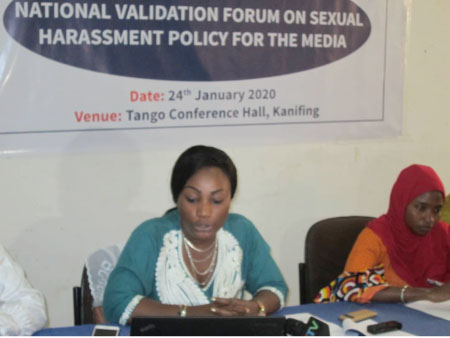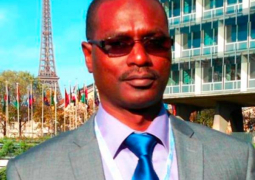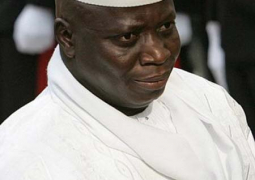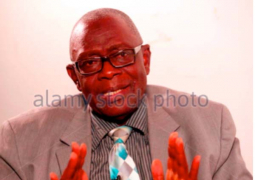
A
principal programme officer and coordinator at UNESCO/NATCOM has lamented that
the increasing number of sexual harassment of female journalists is a cause for
concern. She, however, affirmed that when the draft bill is passed and assented
to, it would serve as a warning that the days of sex for work and promotion in
media organisations is coming to an end.
Maimuna
Sidibeh was speaking on Friday at a day’s national forum on sexual harassment
policy for the media convened by Women Journalists’ Association of The Gambia –
WOJAG and The Gambia Press Union
The Gambia Press Union, through the Women
Journalists Association of The Gambia, is implementing a project, entitled
‘Breaking the Gender Barriers in the Media.
The 12-month project is funded by the United Nations Scientific,
Educational and Cultural Organisation (UNESCO).
She
continued: “We are aware that quite a number of women newspaper journalists are
sexually harassed and these harassments ranged from degrading comments to
physical sexual assault. There have been stories that demand “for sex from
young employees most especially those coming new into the profession, before
they can be given assignments or even have their stories published”.
Recently, IFJ statistics, she explained
revealed that “at least one in every two journalists have suffered sexual
harassment, psychological abuse, online trolling and other forms of human
rights abuse”.
Workplace
discrimination, she went on, had denied many competent female journalists their
deserving right to move up the ladder or even to cover very important beats for
the political or economic departments of the media houses.
“Most
of these beats or assignments are often given to male journalists some of whom
are not as competent as their female colleagues in the same department. As we speak, we are aware that most young
women are unwilling to take up print journalism as a career and newspaper
houses have fewer women as compared to some few years ago,” she added.
She
said that as the harassments continue,
many female journalists still do not report such incidences, many organisations
still do not have reporting systems and some newsrooms still believe there are
beats exclusively preserved for men.
“Although
sexual harassment does not discriminate by gender, there are generally more
women who are targeted and sexually harassed than men. Even in today’s modern
society, women are on average paid less than men and are still treated
differently in the workplaces, simply because of their sex”.
She
acknowledged that women constitute a significant number of media practitioners;
but their condition of work is mainly a reflection of the condition of the
country’s women population.
Female
journalists, she added, are faced with patriarchy systems or socio-cultural and
religious stereotypes that considered their position and role in society as
inferior to that of men, neither are they expected to be heard or seen in
public spheres.
This,
she explained, is reflective of the situation in the broadcast industry, adding
that they are faced with job insecurity in the newsrooms; lack of adequate
skills compared to their male counterparts; low prospects of promotion and
unacceptable levels of vulnerability to male bosses.
“The
under-representation of women journalists in key decision making positions in
the Gambian media institutions contributes to the under-reporting of women’s
issues. This subtly leads to the
equitable way that media images reflect or reinforce stereotypes about men and
women and replicate traditional/ societal inequalities unfavourable to women”.
She
expressed optimism that at the end of the day, the ideas put forward by
participants would be put to good use.





